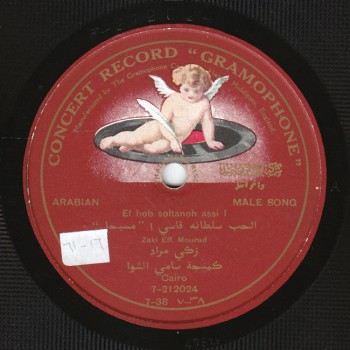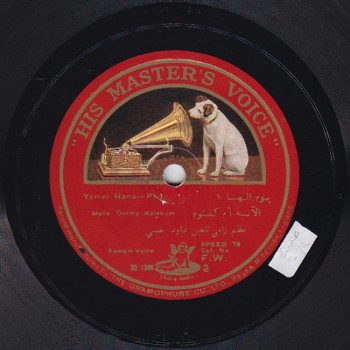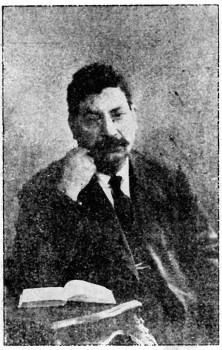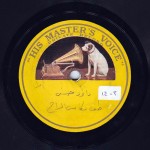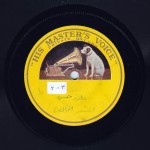The Arab Music Archiving and Research foundation (AMAR), in collaboration with the Sharjah Art Foundation (SAF), presents “Min al-Tārīkh”.
Dear listeners, welcome to a new episode of “Min al-Tārīkh”.
Today, we will be resuming our discussion about Dāwūd Afandī Ḥusnī with Prof. Frédéric Lagrange.
Let us talk about the occidental hats.
There is a famous story concerning “El-ḥubb sulṭānu āsī” composed by Dāwūd Ḥusnī: It is said that most muṭrib refused the concept of this dawr because it was the first long dawr composed to the ‘ajam maqām that scared them because they considered it to be linked to western music. While the treatment of the ‘ajam in this dawr is in no way close to the “major”: It was actually an Arabic ‘ajam in the true sense.
At first, Zakī Murād refused the concept of this dawr saying: “Will we sing with occidental hats?”.
Again?!
Again!
He was finally convinced with this dawr and performed it marvellously, among others who sang “El-ḥubb sulṭānu āsī”.
Sayyid al-Safṭī.
Sayyid al-Safṭī, right.
Let us listen to it in the voice of Zakī Murād who interpreted it marvellously, didn’t he?
Of course… It is one of Zakī Murād’s best tunes.
(♩)
There is evidence that the noble competition between Dāwūd Ḥusnī and Ibrāhīm al-Qabbānī was coupled with mutual admiration: Indeed, Dāwūd Ḥusnī recorded “El-bulbul gānī we-allī” composed by Al-Qabbānī…
… And Ibrāhīm al-Qabbānī composed for Dāwūd Ḥusnī dawr “aḥibb el-ḥusn khāliṣ”, didn’t he?
Exactly…
Something we lack nowadays… And we shed crocodile tears over the state of music…
What does the expression “an extension of Muḥammad ‘Uthmān” mean?
First, there is an obvious influence of a specific type of Muḥammad ‘Uthmān’s melodies, i.e. his later long dawr including “Lisān el-dam‘ afṣaḥ min bayānī” or “Kādnī el-hawa”… or ‘Abduh al-Ḥāmūlī’s melodies.
The performance by a muṭrib or a muṭriba of almost all Dāwūd Ḥusnī’s dawr may necessitate four record-sides.
The structure of his dawr is clear and solid, and includes some fixed melodic elements such as some lāzima –especially the transitional lāzima, when the maqām shifts from a section to another– in almost all the recordings of this specific dawr, as well as the āhāt whose composition does not go against the freedom in their interpretation.
The composition of dawr by Ibrāhīm al-Qabbānī’s and Dāwūd Ḥusnī’s generation took into account the place where the disc will be turned.
I agree, since part of Dāwūd Ḥusnī’s and Ibrāhīm al-Qabbānī’s production was done before the arrival of record companies, and the other part starting their arrival. They were under contract with the companies who paid them a fee: so they composed their dawr with a view to record them.
The dawr were maybe recorded before being performed on stage with the takht by the muṭrib or the muṭriba. So their recorded performance may have already been famous before their live performance with takht.
There is a difference between both recordings by Dāwūd Ḥusnī and by Zakī Murād of beautiful dawr “Bi-el-‘ish’ anā albī hānī” to the jahārkāh in the tafrīd, the waḥāyid, and the āhāt: the sections where Dāwūd Ḥusnī intends the disc to be turned are very obvious.
Shall we listen to him?
Ok…
(♩)
This setting/fixing of melodic elements is ensured by trustworthy performers such as Sayyid al-Safṭī and Zakī Murād.
Moreover, Dāwūd Ḥusnī who is among the first composers who invented a special way to write music, lacked any knowledge of the western notes, so he sought the help of his friend Muḥammad Ṣāliḥ, and maybe of some European musicians residing in Egypt in the early 20th century.
Concerning this issue, I wonder if Dāwūd Ḥusnī also had the notes of his dawr written, besides those of his theatre tunes.
What do you think?
I think that a source, probably in “Rawḍat al-balābil”, mentioned that Ibrāhīm al-Qabbānī and Dāwūd Ḥusnī only wrote for reference purposes: they recorded a short version of the dawr on their cylinder record phonograph they had at home, and only had the notes written for the gentlemen who played the piano during plays. I am not sure if they also had the notes of their dawr written.
This information was related by both Rizq, and Aḥmad al-Jundī who added that Dāwūd Ḥusnī’s memory was so good he could compose the beginning of a dawr during a certain month, then leave it aside and resume it six months or a year later, remembering the general idea of this dawr exactly, and resuming it from right where he had stopped it. This proves that he did not need to write down the notes.
As for more modern musicians such as Sayyid Darwīsh for example, their theatre tunes are indeed written in full, but not the dawr.
Probably because they believed that the spirit of the dawr and the spirit of theatre tunes were very different, and that their paths were totally divergent.
The dawr school ended around the late 1920’s and the early 30’s.
Dawr composed up to the 1950’s and even the 1960’s are considered as “digressions”, and are not necessarily the most beautiful.
The dawr died with the death of the Khedivial school or the school of Literary Arabic Music –to avoid a terminology that might link this musical repertoire to specific political circumstances.
The most beautiful and most famous voices who performed these very late dawr include Umm Kulthūm for whom Dāwūd Ḥusnī composed many dawr the most famous of which is “Yōm el-hanā”. But there are other dawr: “Ḥusn el-ṭab‘ illī fatannī”, “Sharraf ḥabīb el-alb”, “El-bu‘d ‘allimnī el-sahar”, and “Rūḥī we-rūḥak fī imtizāg” that includes a passing glimpse to the first encounter between Almaẓ and ‘Abduh al-Ḥāmūlī.
It is obvious.
“Rūḥī we-rūḥak” undoubtedly includes an intrinsic allusion whose riddle can only be solved by Egyptian Music History experts.
Out of these dawr, I prefer “Yōm el-hanā” even though it is widely known, and “Ḥusn el-ṭab‘ illī fatannī”
What about you?
…We could negotiate a little and decide which dawr we will listen to.
Let us listen to “Yōm el-hanā”.
Still, I prefer “El-bu‘d ‘allamnī el-sahar”, but I will play “Yōm el-hanā” for your sake and because you are my senior.
…The right of seniority…
My dearest Abū Shōna…
(♩)
Dear listeners,
We have reached the end of today’s episode of “Min al-Tārīkh”.
We thank Prof. Frédéric Lagrange and we will meet again in a new episode to resume our discussion about Dāwūd Afandī Ḥusnī.
“Min al-Tārīkh” is brought to you by Mustafa Said.
- 221 – Zakariyya Ahmed – 12 (1/9/2022)
- 220 – Zakariyya Ahmed – 11 (1/9/2022)
- 219 – Zakariyya Ahmed – 10 (11/25/2021)
- 218 – Zakariyya Ahmed – 9 (10/26/2021)
- 217 – Zakariyya Ahmed – 8 (9/24/2021)
- 216 – Zakariyya Ahmed – 7 (9/4/2021)
- 215 – Zakariyya Ahmed – 6 (8/28/2021)
- 214 – Zakariyya Ahmed – 5 (8/6/2021)
- 213 – Zakariyya Ahmed – 4 (6/26/2021)
- 212 – Zakariyya Ahmed – 3 (5/27/2021)
- 211 – Zakariyya Ahmed – 2 (5/1/2021)
- 210 – Zakariyya Ahmed – 1 (4/28/2021)
- 209 – W-al-Lāhi lā astaṭī‘u ṣaddak 2 (4/6/2017)
- 208 – W-al-Lāhi lā astaṭī‘u ṣaddak 1 (3/30/2017)
- 207 – Bashraf qarah baṭāq 7 (3/23/2017)

